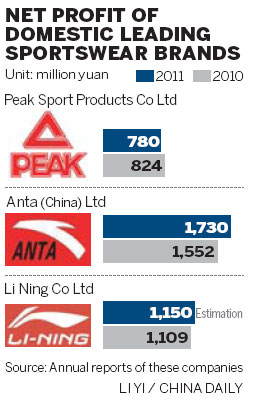Athletic apparel makers seeking new game plan
Slowing growth forces many to cut back retail networks, focus on profitability
Domestic sportswear companies have seen their growth slow amid rising costs for raw materials, labor and rent, pushing some to prune low-performing stores from their retail networks.
Three companies' results illustrate the industry's plight.
Peak Sport Products Co Ltd's profit fell 5.4 percent last year to 777.7 million yuan ($122.8 million) even though its revenue rose 9.5 percent to 4.65 billion yuan.
Liu Xiang, a public relations executive at Peak, said higher cotton prices, rising ad rates and increasing personnel costs cut profits.
Li Ning Co Ltd, meanwhile, estimated its revenue for 2011 fell from 6 to 7 percent, with net profit down 7 to 8 percent. It cited sluggish order growth and rising inventories.
Anta (China) Ltd said its net profit rose 11.5 percent to 1.7 billion yuan, but the growth rate for its net profit fell 10 percentage points.
"This year is a time for adjustment," Liu told China Daily.

"The future of the sportswear industry lies not in the number of retail outlets or the level of prices, but in the quality of products and branding."
He said the days in which domestic sportswear brands built their profits on a rapid expansion of their distribution networks have ended.
Those days were short-lived, dating basically from the 2008 Olympic Games, when sportswear brands expanded rapidly and sought public listings.
The surge in the number of retail outlets pushed down profits per store and drove up inventories. The industry is enduring a mid-life crisis, when brands' designs and quality are hard to differentiate.
Peak's retail network reached 7,806 outlets last year, up by 582 outlets. It's expected to pare its presence back to about 7,000 shops this year.
Li Ning had more than 7,900 outlets at the end of 2010. Now, to cut costs and fatten profits, the company plans to cut staff and trim expenses aside from those in marketing and research and development.
"The reduction of staff is a result of fast expansion," Ma Li, an apparel analyst at China Galaxy Securities Co Ltd, told the Commercial Times. "This phenomenon applies to almost all domestic sportswear brands."
Restructuring the distribution channel is a way for companies to free up cash and increase profits. Peak will consolidate its retail network to create fewer but larger stores, while closing small outlets in less prime locations, Liu said.
While concentrating on basketball sportswear to maintain its unique industry position, the company will also develop products for other sports such as soccer and tennis.
Domestic players are also looking overseas.
Peak opened a new retail outlet in Los Angeles in December and another in February. It has also seen growing demand from emerging markets in Asia, Africa and South Africa.
Looking ahead, Liu said: "We are still optimistic about the long-term development of the industry despite recent slower growth."
He said that fundamental drivers of the industry's growth, such as urbanization and the increasing popularity of sports, have not changed.
wangzhuoqiong@chinadaily.com.cn
(China Daily 03/16/2012 page15)








